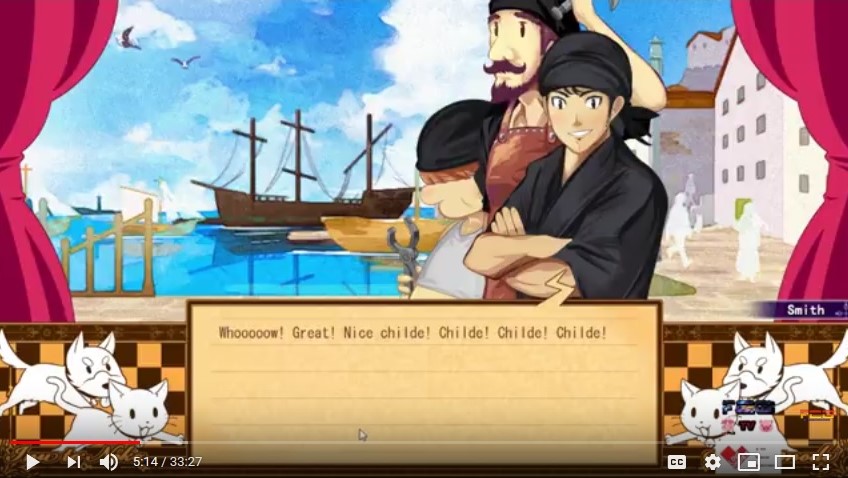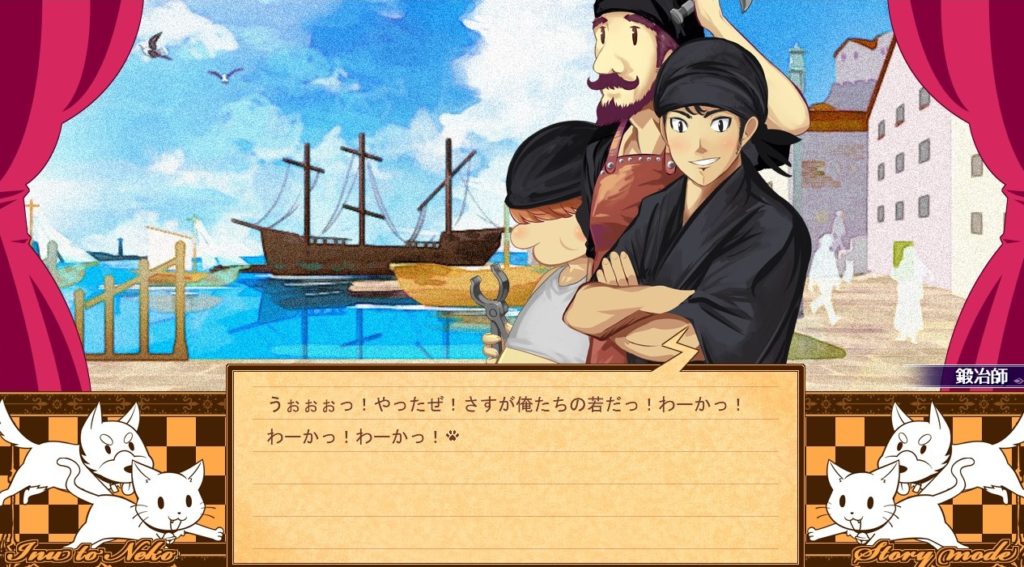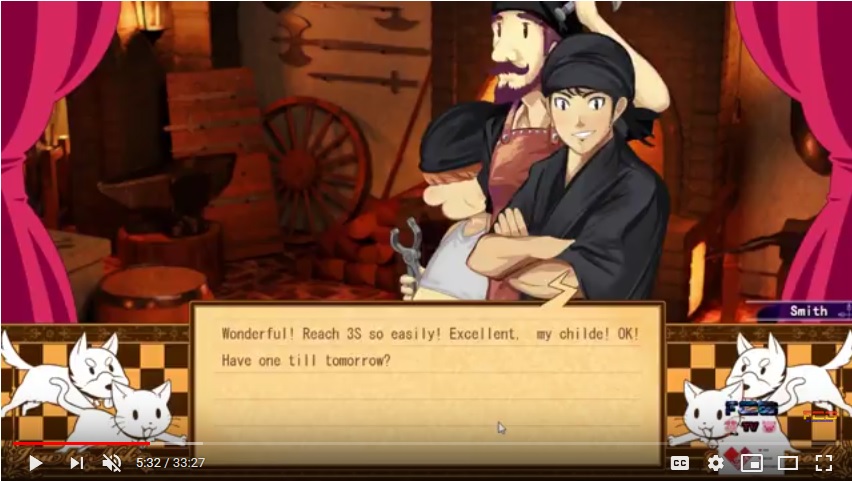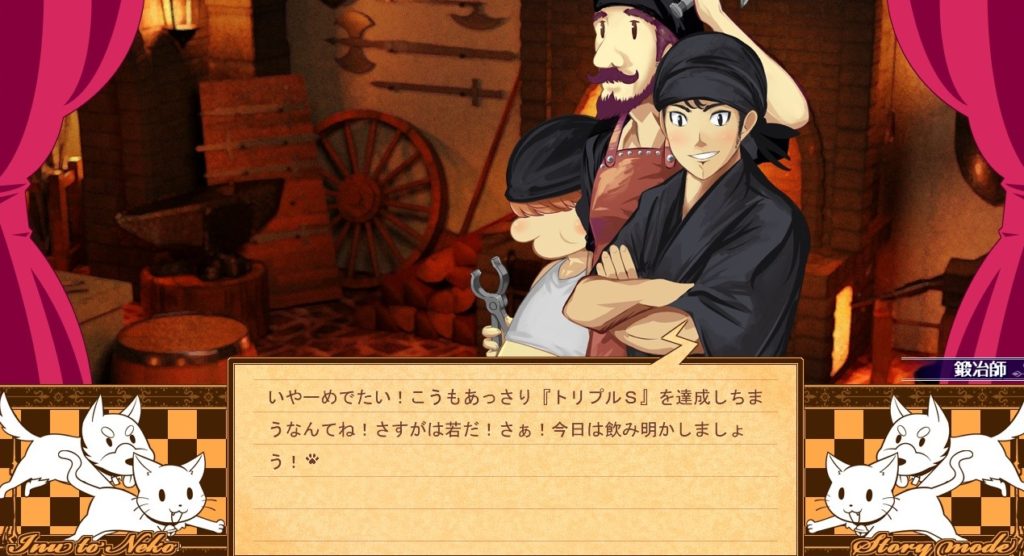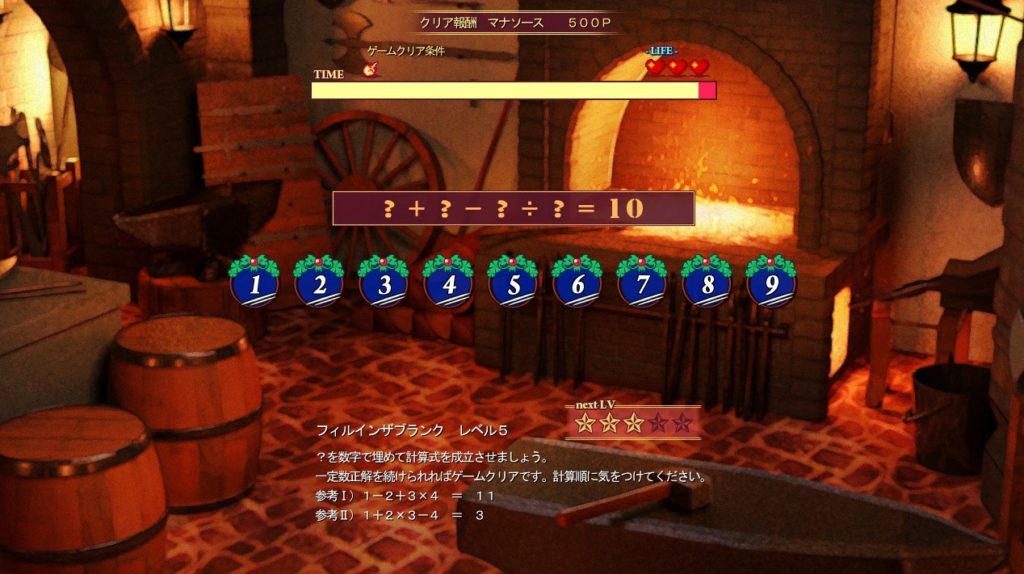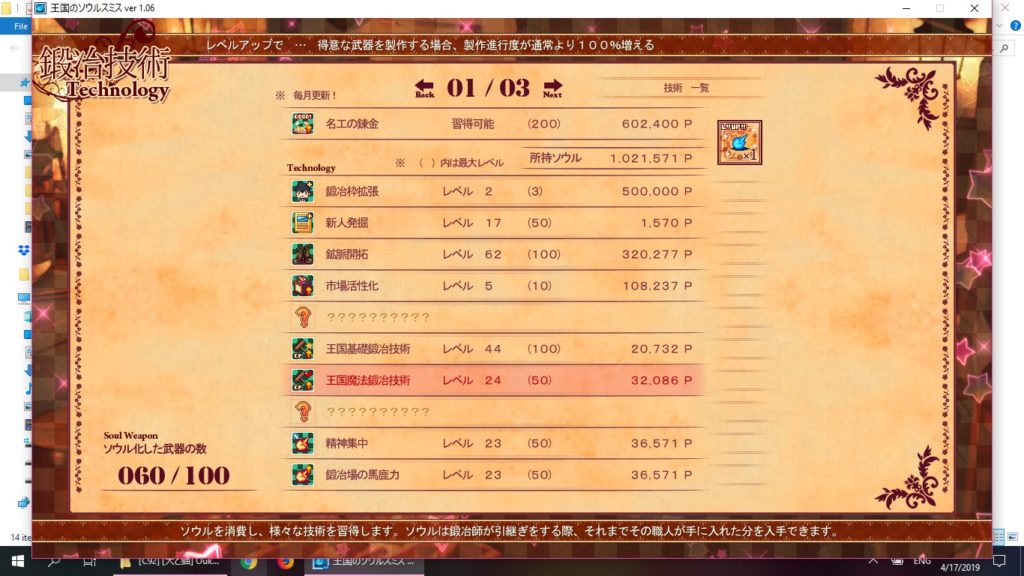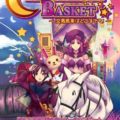Soul Smith of the Kingdom / 王国のソウルスミス is a training/management simulation game by inutoneko, a Japanese indie game circle I’ve been following for years. Last time I played one of their games, I mentioned that they had started releasing games in English on Steam. I had heard the quality wasn’t the best, but I thought I should check one out anyway. After comparing the opening sequence for the English and Japanese versions… I went with the Japanese. Sorry, localizers. I’m sure you’re trying your best but… no. It’s not good.
Not to kick them while they’re down, so I’ll give just two examples. I found the English sequence in this video, btw (gotta give credit where it’s due). The narration is in German but the game is in English.
Example 1 (English)
This “childe” they’re screaming out is actually “若” in Japanese. The word by itself does/can mean “young” or “child” and in this case, the daughter of their boss. But in English you don’t call your boss’s daughter “childe.” You can use her name, or you can call her “Miss” or some other title, but what is this “childe” business? Childe Roland?
Example 2 (English)
Example 2 (Japanese)
I already explained the main character is their boss’s daughter. She’s not “my childe”. Also that “Smith” in the corner should be “Smiths” since there’s more than one of them. Even if the translator didn’t know – which is likely because game translators frequently translate from raw scripts without reference to the game – an editor should have caught it and added a simple S before release.
Beyond that, what is this “Have one till tomorrow”? In Japanese it is “今日は飲み明かしましょう!” I.e. “Let’s drink the night away!” or “Let’s drink till we’ll drop!” or something along those lines. “Have one till tomorrow”… strictly speaking, all the words can be found in the English dictionary, but that’s as close as you can get to the sentence making sense, much less being close to the original Japanese.
So a brief comparison was enough to persuade me to stick to the original, at least for Soul Smith of the Kingdom. Other games might have better localizations, I don’t know. And I should added that outside the opening scene and optional story scenes, there’s very little to read in this game so a bad translation doesn’t have to be a deal breaker. Especially if you can’t read Japanese.
Now, on to the game itself.
Story: The main character is Nine Andelioar, a genius blacksmith from a famous blacksmithing family. Her father decides that while Nine is good at blacksmithing, she lacks management and training skills. Thus he bans her from smithing until she can train blacksmiths capable of fully forging the ultimate sword known as the Soul Smith.
Gameplay: It’s described as an “idle-clicker” i.e. a game that requires very little input from the gamer. You can leave it in the background and check in from time to time and still have fun somehow. In theory. Here’s the main menu:
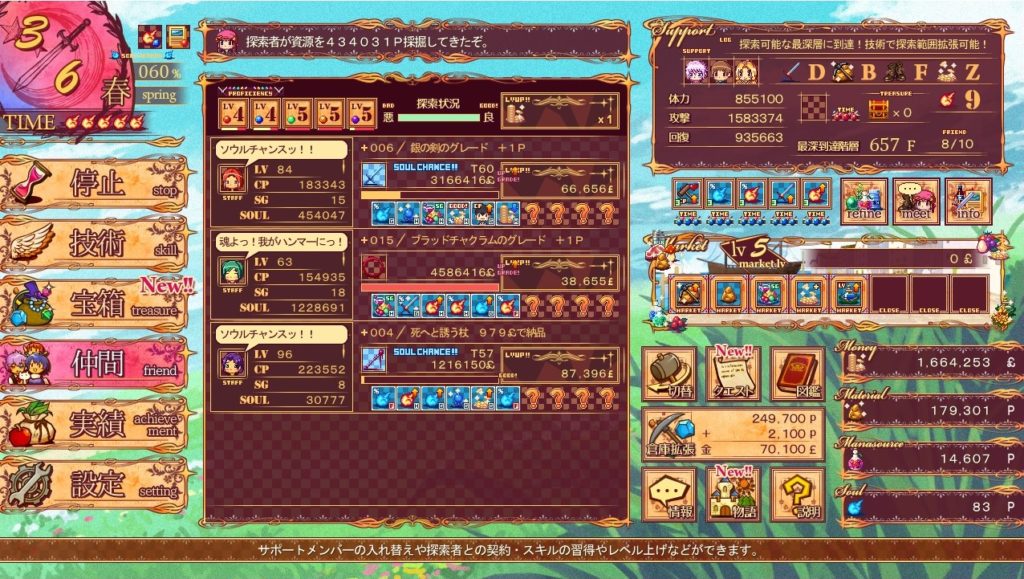 The basic layout is this – you hire apprentices and set them to work making and selling weapons. You use the money you earn from this to expand your depot so you can hold more materials, buy useful skills and items from the market place, level your smiths up so they can make better stuff. Once they’ve grown as far as they can, you transfer them to another company branch and hire even better smiths.
The basic layout is this – you hire apprentices and set them to work making and selling weapons. You use the money you earn from this to expand your depot so you can hold more materials, buy useful skills and items from the market place, level your smiths up so they can make better stuff. Once they’ve grown as far as they can, you transfer them to another company branch and hire even better smiths.
Soul Smith of the Kingdom is called an idle game because weapon forging and selling is mostly automatic. As long as they have enough material, you just tell them what to make and they’ll make it forever and ever, no breaks, no strikes, no need to even pay or feed them. It’s a literal sweatshop, but the workers are so happy and excited to be there so don’t feel bad for them.
The thing to note in the menu screenshot is the “Soul Chance!!” in blue next to two of my smiths. It’s only when a blacksmith can fully grasp the “soul” of the weapon they’re making that they can be said to have mastered the art of making that weapon. Or something like that. During a Soul Chance, a countdown appears and the forging gauge slows down. If the smith can fully forge the weapon before the countdown reaches T0, they’ll get the Soul of the weapon. The first time this is done on a weapon it will also unlock a new weapon recipe. And it will add 1% to the completion gauge in the top left corner, which is at 60% in the screenshot above.
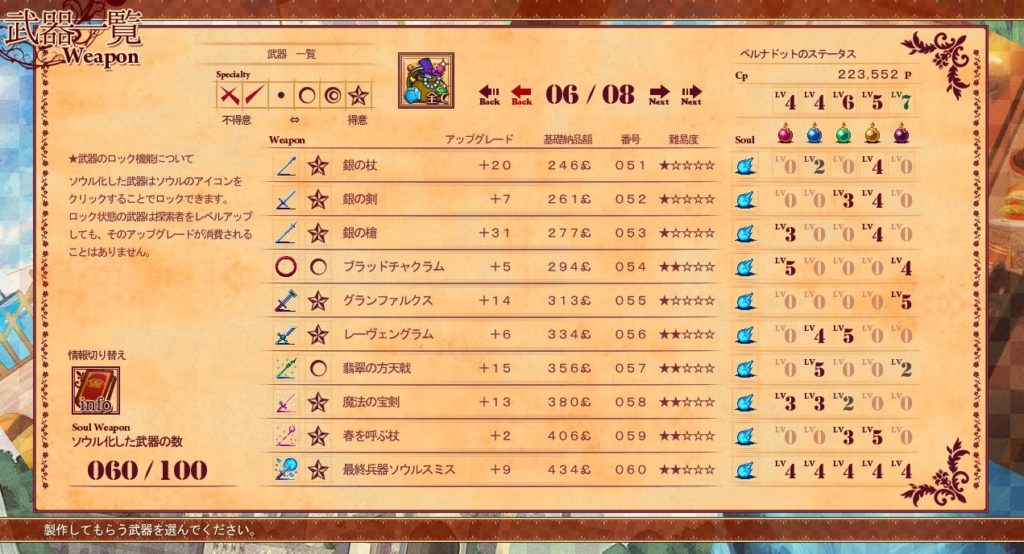 Here’s a list of the kinds of weapon you can make. You can see I’ve gotten the souls of 60 out of the 100 weapons in the game. Thus the little blue “Soul” next to them. The legendary Soul Smith sword is No. 60 on the list, so you don’t have to finish the whole chart to get the ending. There’s a second ultimate weapon, the Olivier, that is No. 90 on the list and which earns you a second ending, but that’s too much work so I quit after the Soul Smith.
Here’s a list of the kinds of weapon you can make. You can see I’ve gotten the souls of 60 out of the 100 weapons in the game. Thus the little blue “Soul” next to them. The legendary Soul Smith sword is No. 60 on the list, so you don’t have to finish the whole chart to get the ending. There’s a second ultimate weapon, the Olivier, that is No. 90 on the list and which earns you a second ending, but that’s too much work so I quit after the Soul Smith.
Let’s see, what more should I cover… Maybe the hiring process. To hire better smiths, you need to raise the proficiency of your forge (think of it as fame or expertise) and pay huge sums of money to attract good talent. The more money, the better. See the bold numbers like 4 4 6 5 7 on the right side of the screenshot above? Those are smith/weapon proficiency levels of various elements. If a weapon requires a proficiency of 2 in fire and 4 in light, a smith with those abilities will have a very easy time forging it. Easier time = faster speed and greater profits + much better chance to succeed in getting a Soul.
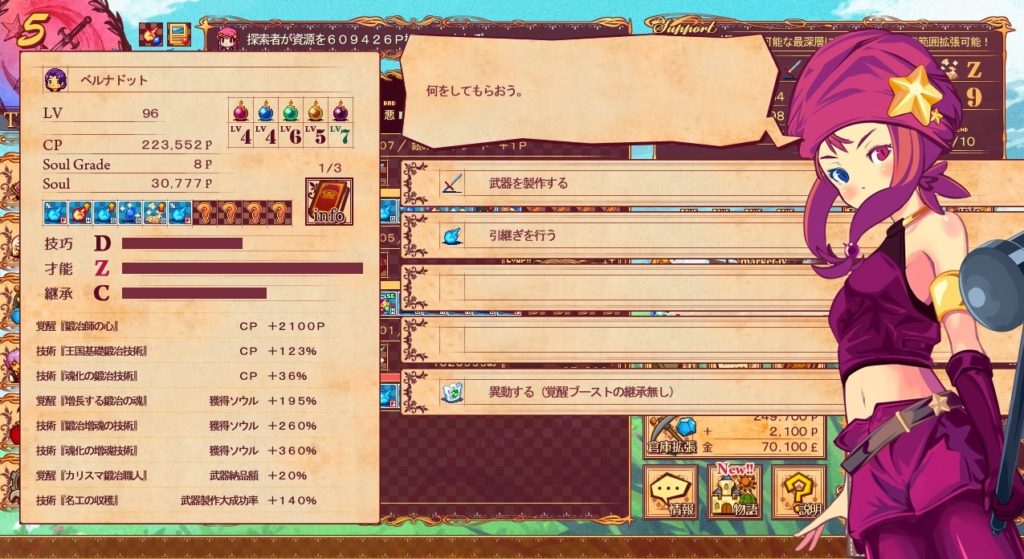 Here are the stats of one smith in more details. The D Z and C represent Skill, Talent and Inheritance, which mean various things but I’m too lazy to explain. The blue boxes are Awakened Boosts, basically skills that help in forging like giving you extra money or a better rate of triggering Soul Chances. This smith has 4 4 6 5 7 proficiency in the elements, which is excellent, and I had to do a lot of reloading to get him. CP affects the speed of forging, also very important and raised by leveling up. The list of skills below the Skill, Talent and Inheritance bars are Nine’s skills/Friend skills that affect smithing.
Here are the stats of one smith in more details. The D Z and C represent Skill, Talent and Inheritance, which mean various things but I’m too lazy to explain. The blue boxes are Awakened Boosts, basically skills that help in forging like giving you extra money or a better rate of triggering Soul Chances. This smith has 4 4 6 5 7 proficiency in the elements, which is excellent, and I had to do a lot of reloading to get him. CP affects the speed of forging, also very important and raised by leveling up. The list of skills below the Skill, Talent and Inheritance bars are Nine’s skills/Friend skills that affect smithing.
Smiths can only be developed up to a point. After that you’re just throwing money in to little effect and it’s time to let them go and hire newer, better workers. But before they go, they can pass on some of their Awakened Boosts to others.
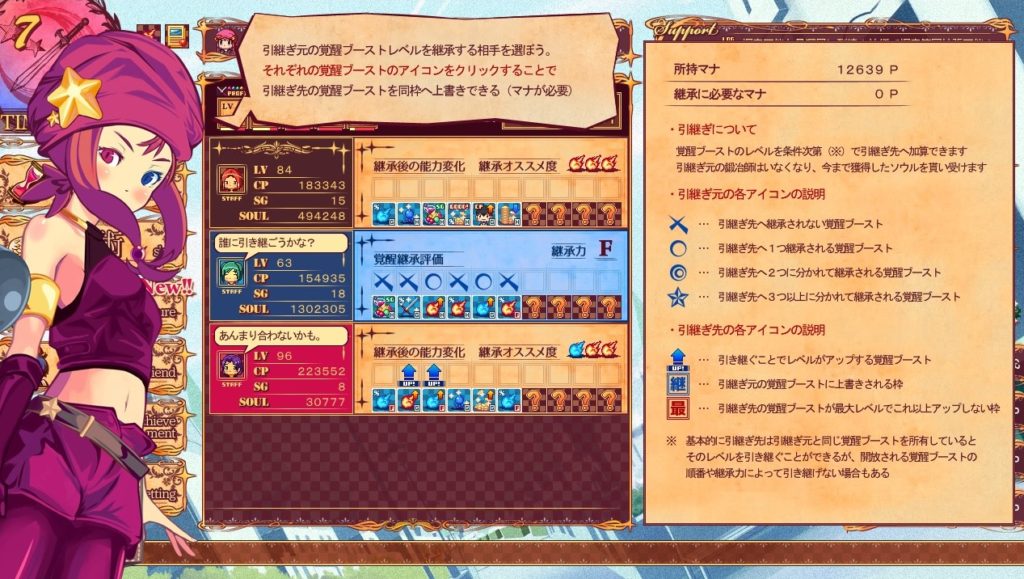 That’s what the “Inheritance” bar affects. With a lot of effort and time, you can eliminate useless skills and stack the deck with skills that help with triggering and succeeding in Soul Chances, bringing you closer to the end of the game.
That’s what the “Inheritance” bar affects. With a lot of effort and time, you can eliminate useless skills and stack the deck with skills that help with triggering and succeeding in Soul Chances, bringing you closer to the end of the game.
Since Nine herself is stuck in the forge supervising and managing smiths, the work of gathering the necessary materials falls to the usual cast of the Ishwald games. Who also don’t get paid and don’t take breaks and have to hand over everything they find in the dungeons to Nine. But at least she gives them sweet weapons, accessories and level ups, so that’s good.
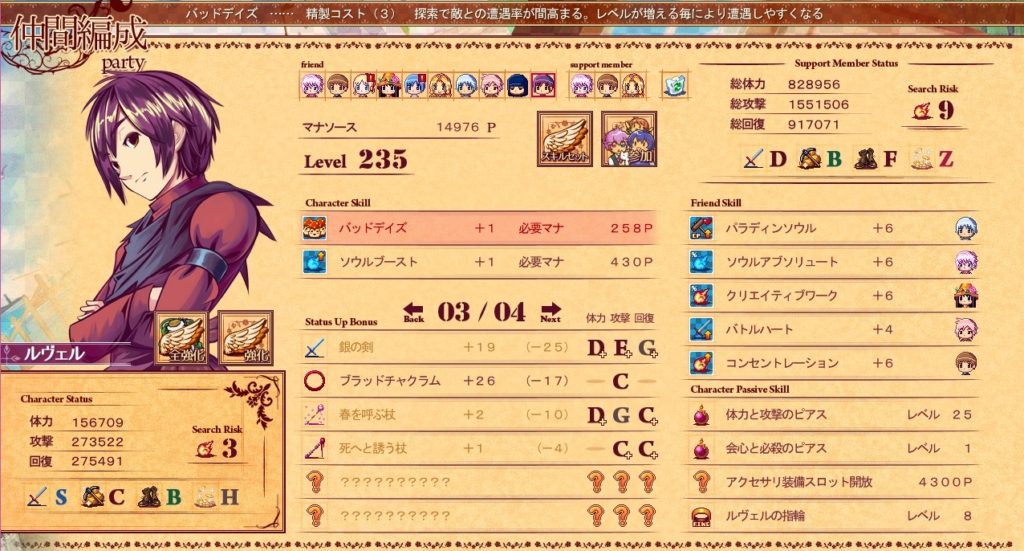 There’s way too much going on there to unpack in one post. The important thing is to pick characters with good skills to contribute to your pool of Friend Skills that affect the whole party/your forge. For example both Fill and Marietta have Critical Smith skills that raise the likeliness of succeeding in Soul Chances. Xian has a skill that gives boosts to attack. Palcheresse can get you better prices for your weapons. ETC.
There’s way too much going on there to unpack in one post. The important thing is to pick characters with good skills to contribute to your pool of Friend Skills that affect the whole party/your forge. For example both Fill and Marietta have Critical Smith skills that raise the likeliness of succeeding in Soul Chances. Xian has a skill that gives boosts to attack. Palcheresse can get you better prices for your weapons. ETC.
Characters also excel at different things inside dungeons. So if you want to collect more loot and materials, you can put characters with high loot drop rates together. If you just want to clear levels and delve deeper, use people like Ruvel and Shio to get the job done. But there’s no need to overthink teams too much. It’s all automatic so just strengthen the team with fresh weapon upgrades from time to time and everything will be fine.
Last things to mention before moving on to whether I liked Soul Smith or not: Manasource and Souls. Two other currencies apart from cold hard cash. Manasource is used to unlock characters and also unlock, upgrade and sustain Friend skills. You get it from fun… yeah, some of them are fun… fun minigames, treasure chests and achievements.
It’s the need to stop regularly to earn manasource via minigames that stops Soul Smith from being the perfect idle clicker. In an ideal world you would gather good blacksmiths, set them to work on a weapon, come back in a while to see if they’ve gotten the soul, switch them to another weapon and go away again, etc. And I did do that, but Friend skills are really helpful, so what I would do was play a lot of minigames to build up a lot of Manasource and then idle until it was almost all gone, rinse, repeat.
Souls are earned by succeeding at Soul Chances. Only the first success counts towards game completion, but subsequent successes earn Soul points that Nine can spend on skills.
There are skills to enlargen the dungeon and the market, skills to give you a better selling price for your goods, skills to raise smith CP, etc etc.
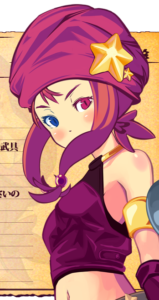 What I thought about Soul Smith
What I thought about Soul Smith
Soul Smith of the Kingdom is one of those games I enjoyed a lot when I was playing it, but now I’m done I’m not sure what I saw in it. I enjoyed some of the minigames. I liked (?) the hiring process, though it involved a lot of reloading. Trying to find the right people with the right balance of skills is harder than it looks. I also liked getting new weapons and upgrading my adventurers so they could delve deeper into the dungeons. And it’s really satisfying when you finally manage to successfully get a weapon’s soul after many attempts.
Getting the Soul Smith weapon soul is a good goal and a good place to stop. After that raw luck starts to play a much larger part in Soul Chances instead of skills and stats. Can you trigger enough Critical Smiths to win or not? It’s all down to luck. You also need a LOT more money to get talent that can forge 5+ proficiency weapons. This means you’ll have to let the game idle for much longer while your smiths earn money, only to blow half of it on one worker and then start again. It’s tedious beyond the Soul Smith point so I’d say 60% of the game is fun, the other 40% seemed so tedious I couldn’t be bothered.
TL;DR – Soul Smith is not too complicated, not too involved, will keep you busy for about 10 hours. It’s good if you don’t want anything deep or long-winded, apart from that it’s nothing special.
